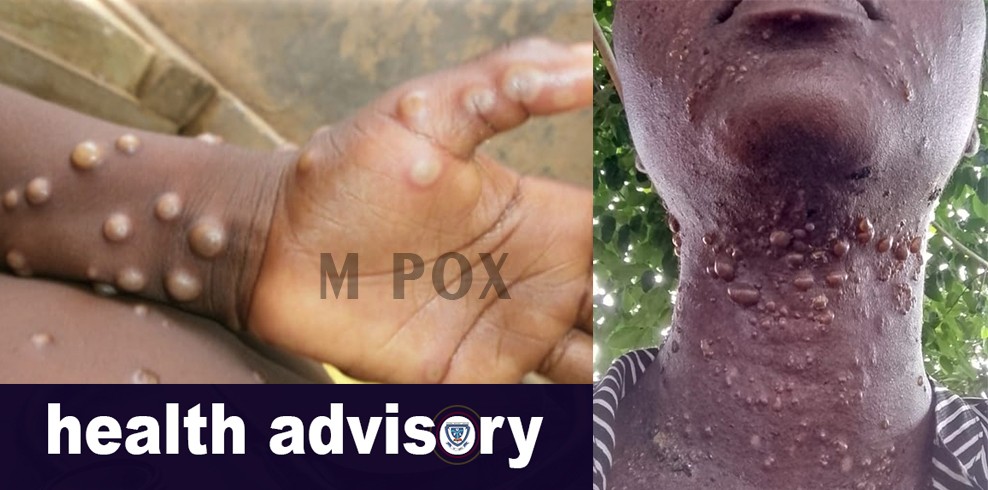Most Recent News
FUL Medical Center Issues Health Advisory on Monkey Pox
-
 Chris Yahaya
Chris Yahaya
- August 27, 2024, 12:16 am

Monkeypox (more correctly, Mpox) is a rare viral zoonotic infectious disease (i.e. an infection transmitted from animals to humans).
It is caused by the monkeypox virus which is in the same class as the smallpox virus, and the cowpox virus. The first human case was recorded in 1970 in the Democratic Republic of Congo during a period of intensified efforts to eliminate smallpox. Since then, monkeypox has been reported in humans in other central and Western African countries including Nigeria, Cameroon, Gabon, Côte d'Ivoire, Liberia, Central African Republic, Congo, South Sudan, and Sierra Leone. A global outbreak occurred in 2022- 2023. Its recent resurgence and spread in the Democratic Republic of the Congo and a number of other African nations constitutes a health emergency of international concern according to the World Health Organization which stated on the 14th of August that mpox has the 'potential to spread further across countries in Africa and possibly outside the continent.'
Nigeria had her last significant outbreak of the virus in 2017, with occasional cases noted. Recently, more cases have been reported across the nation. According to NCDC data, the last confirmed case in Kogi State was in 2023, with nearby states like FCT, Enugu, and Benue recording about 9 confirmed cases in total in 2024.
Transmission:
The exact reservoir of monkeypox is still unknown although African rodents are suspected to play a part in transmission. The virus can spread both from animal to human and from human to human with transmission occurring when a person comes into contact with the virus from an infected animal, human, or materials contaminated with the virus such as bedclothes. The virus enters the body through broken skin, the respiratory tract, or the mucous membranes of the eyes, nose, or mouth. This can happen through a bite, scratch, handling, or eating of inadequately cooked infected bushmeat.
Human-to-human transmission is thought to occur primarily through prolonged close contact with infected persons. Close contact includes skin-to-skin (such as touching or sex) and mouth-to-mouth, or mouth-to-skin contact (such as kissing), and can also include being face-to-face with someone who has mpox (such as talking or breathing close to one another, which can generate infectious respiratory particles).
It can also result from direct contact with the body fluids or skin lesions of an infected person, or objects they have contaminated such as clothing or bed linen. As such, household members or healthcare workers are at greater risk of infection.
People with mpox are considered infectious until all their lesions have crusted over, the scabs have fallen off and a new layer of skin has formed underneath, and all the lesions on the eyes and in the body (in the mouth, throat, eyes, vagina, and anus) have healed too, which usually takes from 2 to 4 weeks.
Symptoms
The incubation period of monkeypox is usually between 6 to 16 days but can range from 5 to 21 days.
Mpox can cause a range of signs and symptoms. While some people have less severe symptoms, others may develop more serious illnesses and need care in a health facility. Common symptoms of mpox include a rash that may last for 2–4 weeks. This may start with, or be followed by, fever, headache, muscle aches, back pain, low energy, and swollen glands (lymph nodes). The rash looks like blisters or sores and can affect the face, palms of the hands, soles of the feet, groin, genital and/or anal regions. The skin rash usually has flat bases and appears 1-3 days after the onset of fever, developing into small fluid-filled blisters, which become pus-filled and then crust over in about 10 days.
These lesions may also be found in the mouth, throat, anus, rectum, or vagina, or on the eyes. The number of sores can range from one to several thousand. Some people develop inflammation inside the rectum (proctitis) that can cause severe pain, as well as inflammation of the genitals that may cause difficulties urinating.
Nearly all patients have face lesions, three-quarters have lesions on the palms of their hands and soles of their feet, and 30% have genital involvement. The eyes are involved in most cases, 20% have lesions on the eyelid, with some on the cornea.
In most cases, the symptoms of mpox go away on their own within a few weeks with supportive care, such as medication for pain or fever. However, in some people, the illness can be severe or lead to complications and even death. Newborn babies, children, people who are pregnant, and people with underlying immune deficiencies such as from advanced HIV disease may be at higher risk of more serious mpox disease and death.
While only about 0.1% to 10% of infected cases can be fatal depending on the immune system of the infected person, the disease leaves behind significant scarring.
Prevention
Measures that can be taken to prevent infection with monkeypox virus include:
- Avoid contact with animals that could harbor the virus including sick or dead animals in areas where monkeypox cases have occurred.
- Avoid contact with any material that has been in contact with a sick animal.
- Isolate potentially infected animals from other animals.
- Thorough cooking of all animal products before eating.
- Isolation of infected patients, including use of personal protective equipment and implementation of standard infection control precautions by health workers.
- Regular hand washing after caring for or visiting sick people.
- Avoid unprotected sex.
It is important to report any symptoms similar to the one above or any suspected case of the disease to the University Health Services as soon as possible.
Latest News
-
Addressing Misrepresentation About FUL 8th Convocation Accommodation Arrangements - a Rejoinder
November 19, 2024, 4:34 pm -
Apply Now: FUL PG Programmes under Global Institute for Infectious Disease Control 2024/2025 Session
November 15, 2024, 11:33 am -
FUL College of Postgraduate Studies Commences Sales of Forms for Postgraduate Programmes 2024/2025 Session
November 8, 2024, 6:00 pm -
Text of Pre-Convocation Press Briefing for the 8th Convocation Ceremony by FUL VC, Prof. Akinwumi
October 21, 2024, 10:36 am -
Invitation: FUL Organizes 2nd Annual Colloquium in Honour of Prof. Olu Obafemi
October 19, 2024, 6:11 pm -
FUL Releases Health Advisory for 8th Convocation Ceremony
October 19, 2024, 9:33 am -
Founders' Day: Federal University Lokoja has come of age!
October 17, 2024, 11:30 am -
Advertise in FUL 8th Convocation Order of Proceedings/Brochure
October 17, 2024, 10:16 am